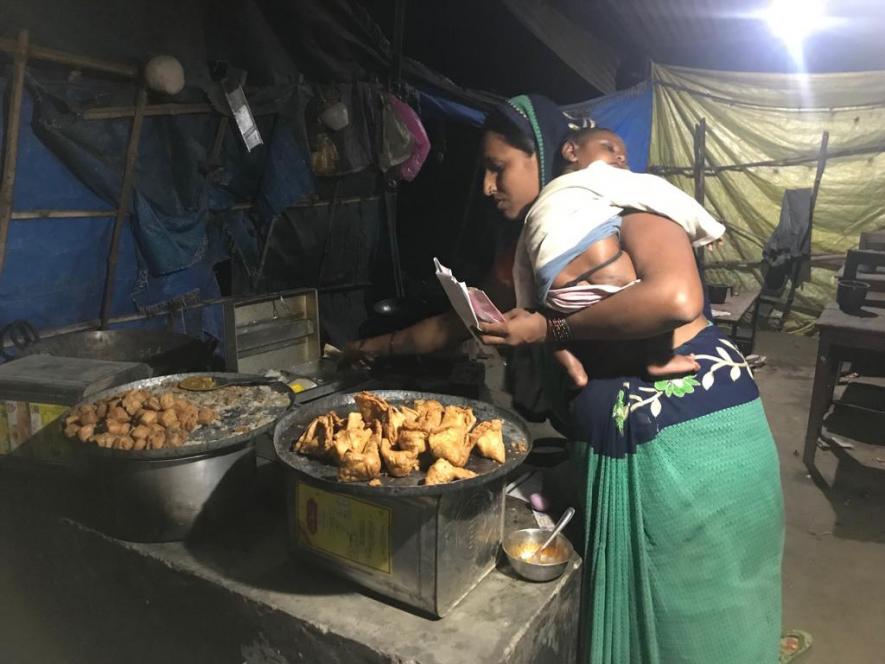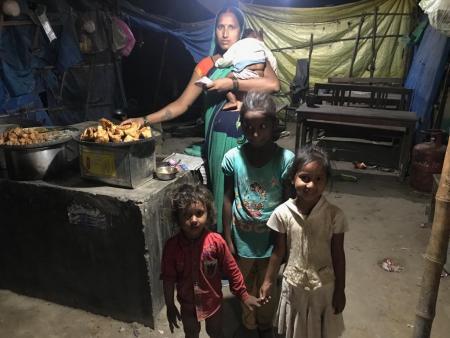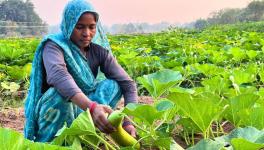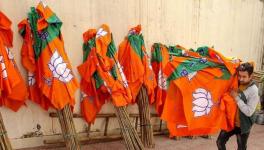Elections 2019: Caste Gets Prominence Even In Poverty-Stricken Maharajganj

Maharajganj (Uttar Pradesh): Hira Lal, 36, who runs a small tea stall at Theki Chowraha Chowk in Maharajganj district of eastern Uttar Pradesh, seems relieved as he finally got his ration card last month after running from pillar to post for months. He now gets rice, wheat and kerosene at subsidized prices under the Public Distribution System (PDS). Though making ends meet with a family of five remains a struggle for him, the problem of buying ration every day with his meagre income (at best Rs 200 per day) has eased to an extent.
He also got an LPG cylinder for free under the Ujjwala Yojana — but, he says, the cylinder is useless as he is unable to get it refilled because of the high cost of the gas.
A father of three children, Hira Lal sends one his two daughters, aged 12, and his 7-year-old son to a nearby government school, because they get food there and two sets of clothes (uniforms) in a year. His eldest daughter, who is 16-year-old, works as a daily wage labourer in the fields.

Elections, he says, hold no meaning for him. “The government comes and goes, big promises are made, but what does not change is our lives. We have to struggle every day for our survival. We begin our days with a challenge to ensure that the stoves at our homes can be lit and the family gets foods at least two times,” he told Newsclick outside his mud house with a roof made of bamboos and straws.
He is landless and somehow managed to erect four walls with a dilapidated roof to provide shelter to his family on the PWD (Public Works Department) land.
“We (he and others like him who have built their homes on the roadside) can be evicted any time, as this is government land,” he added.
As the 2019 Lok Sabha elections enter their last phase, voting in the remaining constituencies, including Maharajganj, will take place on May 19.
But amid all the political rhetoric and allegations and counter-allegations during campaigning, what was missing was any talk or plan to uplift these extremely marginalised sections of society still struggling for everyday survival.
Majeed, 70, a resident of Chowk Bazaar, has to sell mosquito nets and cheaper bed sheets by ferrying them around the villages on his old bicycle to support his family. He has two sons, aged 35 and 28. “The eldest one is a daily wage labourer who does not get work everyday. My younger son studied till graduation and is teaching in a school. The family’s income is not enough to manage basic expenses; therefore, I have to work even in this age,” he said.
Asked about the average income of the three earning members of his family, he said it was somewhere around Rs 8,000 to Rs 9,000. As to how the family expenditures are managed with this measly sum, his reply was, “Aaj tak to chal raha hai, kal ka pata nahin (We have managed so far, but I am not sure about tomorrow).”
He got a bank account opened on his wife’s name under the Jan Dhan Yojana, but has not received a single penny so far. He has not even got his oldage pension.
Asked about elections, he said, “We cast our votes because it is our right. But we have no expectation from any political party. Those who get elected do not even take the pains to keep visiting their constituencies and making an effort to know how their electorate is living.”
Also read: Elections 2019: In UP’s Phase 6, Gathbandhan Continues to Give Tough Fight to BJP?
Ram Chandra Jaiswal, a local worker of the ruling Bharatiya Janata Party (BJP), who was listening to this conversation between the Newsclcik correspondent and the old man at a roadside tea shop, intervened and admitted that local MP Pankaj Choudhary of the BJP had done nothing for his constituency during his two consecutive terms.
“Whenever we went to him with the request of addressing people’s issues — given that they hold us (the party workers) accountable for government’s failure, when we approach them during polls for votes — he never even acknowledged or regarded our effort to pursue the people’s issues as being in his favour. He always told us that he had been winning from here for the past five times, because of the party only. There is a tough battle for him in this election, despite the fact that the election is again being fought in the name of Modi and his achievements,” he told Newsclick.
Jaiswal went on to add that local MLA Jai Mangal Kanojia also proved to be ineffective in addressing people’s issues. “Two years have passed since he was elected to the Uttar Pradesh Assembly from Maharajgang seat, yet he has done nothing. He even does not visit the constituency,” Jaiswal alleged.
Indu, 37, runs a roadside tea-and-snack shop at Choek Bazaar. Already a mother of five children, all minors, she is expecting a baby.
Indu has not been issued a ration card despite running from pillar to post for several months. The Pradhan (village head) has already certified her entitlement, but the authorities concerned are not ready to listen to her.
“I have gone to Maharajganj (the district headquarters) five times with my application. I even went there after I got pregnant. The inspector rejects my application. First, he asked how he could accept that I have five children. To prove it, I once went to his office with all my children. But it was of no avail. This time, he asked to prove that the children are mine. We are illiterate. My husband is a daily wage labourer. All my children were born at home. It is difficult for us to procure their birth certificates because the procedure for getting one is also complicated,” she said.
Indu and her children and husband are living in extreme destitution. The shop where she sells tea and snacks, on a piece of hired land, is her home as well. “When it rains, the water seeps through the roof. We have to take shelter in the nearby government primary school,” she said.
“Sirf kharch nikal jata hai…agar bikri nahin hui to samose ko phenkna padta hai (Somehow the basic expenditures are managed… on days when there is no sale, I am forced to throw the samosas away)”
Her children do not go to school, because they cannot afford to. They help their mother with her work. “School jayenge to khayenge kya (If they go to school, what will they eat)?” she said.
The political history Maharajganj
It is a BJP stronghold. Chaudhary won his first election in 1991 and continued his winning streak in five of the seven elections held here so far. He tested defeat at the hands of Samajwadi Party’s Akhilesh Singh in 1999 and Congress’ Harsh Vardhan in 2009. In the 2014 elections, he defeated BSP’s Kashi Nath Shukla with a margin of 2.4 lakh votes.
He is again up for election and is facing SP’s Akhilesh Singh and Congress’ Supriya Shrinate. While Singh represented the constituency from 1999 to 2004, Shrinate is the daughter of former MP Harsh Vardhan. She is a former journalist who quit her job to join politics. Harsh Vardhan had first won from Maharajganj in 1989 on a Janata Dal ticket, but won the 2009 election on a Congress ticket.
Maharajganj Lok Sabha constituency has five assembly seats — Maharajganj, Siswa, Nautanwa, Paniyara and Pharenda. Except one, from where an independent candidate had won, the rest four Assembly segments went to the BJP in the previous election.
Also read: Elections 2019: Gathbandhan Leads in Phase 5 of UP; Overall, BJP Slips Further
The district, which shares a border with Nepal, is also known for changing the flow of the political wave like the rivers that originate from Himalayas and enter India. Though freedom fighter Professor Shibban Lal Saxena was considered to be close to Mahatma Gandhi and Jawaharlal Nehru, he left the Congress after Independence and contested the elections as an independent candidate. But he lost to Hari Shankar Prasad. He again fought as an independent candidate in 1957 and registered a victory.
To ensure Shabban Lal’s defeat, the Congress fielded his student Mahadev Prasad in the next elections and he won. But Shibban did not accept the defeat and once again won two consecutive elections in 1971 and 1977.
Issues take back bench, caste arithmetic brought into play
Issues concerning the people in Maharajganj, one of the most backward districts of Uttar Pradesh, seems to have taken the back seat.
Instead, the elections are being held on caste and communal lines. The constituency has Other Backward Class (OBC) population makes up more than 56 per cent here. The OBC communities here consist of Kurmi-Patel, Chourasia, Nishad, Yadav, Maurya, Chouhan, Sonar, Naayi and Lohar; while Brahmins constitute 12 per cent of the total electorate in the ‘upper’ caste communities. A small percentage of the Chhatriya and Kayastha community also live here.
Jatavs constitute majority of the Dalit population. Apart from Jatavs, Dalits also include Dhobis and Paasis. The Muslim electorate is also numerically significant here. Two castes of the Schedules Tribes also reside here.
The BJP’s Choudhary belongs to the Kurmi community. Apart from ‘upper’ castes, he is busy consolidating non-Yadav OBCs and non-Jatav Dalits in his favour. On the other hand, Akhilesh Singh, whom the SP fielded at the eleventh hour, is trying hard to win the confidence of Muslims, Yadavs and Dalits. But people say he has an image of a “casteist” and “communal leader who wants dominance of Thakurs — the community he belongs to. Therefore, Muslims and a major chunk of Yadav votes will split.
The Congress’ Supriya Shrinate is also trying hard to get right her caste equation.
In the final and seventh phase of Lok Sabha elections, Uttar Pradesh’s 13 seats — Varanasi, Gorakhpur, Maharajganj, Kushi Nagar, Deoria, Bansgaon, Ghosi, Salempur, Ballia, Ghazipur, Chandauli, Mirzapur and Robertsganj — are going to polls.
All of these 13 seats were won by the BJP in the previous elections in 2014. The counting of votes for the Lok Sabha elections 2019 is scheduled for May 23.
Get the latest reports & analysis with people's perspective on Protests, movements & deep analytical videos, discussions of the current affairs in your Telegram app. Subscribe to NewsClick's Telegram channel & get Real-Time updates on stories, as they get published on our website.
























